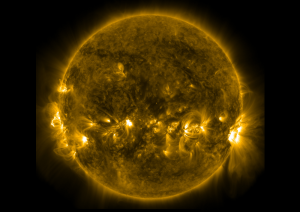5 reasons to look skyward in 2014

Sandra Bullock and George Clooney kept us on the edge of our seats in the movie Gravity. But a constellation of scientists eclipsed the big-screen drama with findings that left us star struck in 2013.
We learned that a lake once sparkled on Mars and that water vapor was spotted over one of Jupiter’s moons. We saw stunning photos of Saturn and watched nail-biting spacewalks at the International Space Station.
By the end of the year, NASA reported 115 million visits to its website -- its second busiest year on record. The agency’s Twitter account had 5.5 million followers. NASA was the public’s third most highly rated government agency, just behind the Centers for Disease Control and the FBI, according to Gallup.com.
So as the New Year begins, here are five reasons to keep looking skyward:
1. We want to colonize Mars. Seriously.
In December, the Mars One foundation announced that 200,000 people had applied for a mission to colonize the red planet, and 1,058 of them had advanced to the next level of screening. These people don’t seem troubled by the prospect that there will be no running to Wal-Mart to pick up a few things. It is a one-way ticket. The foundation plans to launch a manned mission to the planet in 2024. The colonists will "begin human life" on Mars in 2025, according to the site.
2. We can’t look away from the International Space Station, even when things get gnarly.
In July, Italian astronaut Luca Parmitano nearly drowned when his helmet unexpectedly filled with water during a spacewalk. Scientists referred to the incident as a “suit anomaly,” and Parmitano lived to tell the tale.Even so, the incident clouded a subsequent spacewalk in December, soon after a pump on the space station conked out. Before the spacewalk, NASA scientists announced that one of the astronauts would be in the same suit worn by Parmitano. They had jury-rigged the helmets with absorbent pads and makeshift snorkels, just in case. There were no leaks, and the spacewalk was deemed a success.
3. We love the mind-blowing visuals.
Dashboard cameras caught raw footage of a meteor streaking across the Russian sky in February, and soon the video was viral.There could be more interesting high-velocity space stuff to watch before long. In June, NASA announced its grand challenge– inviting industry and other potential partners to offer ideas on how to locate, redirect and explore an asteroid.
4. Space gives – and keeps giving.
As with any government agency, NASA can be dissected from a political perspective. Given the needs on Earth, should we keep shelling out billions for Tonka trucks on Mars? But put another way: Given the educational potential, can we afford to forgo the vast opportunities of space? Let us scrape the surface of planetary dust from this year’s news:
- In October, NASA announced that a pulsed laser beam had transmitted data over the 239,000 miles between the moon and Earth at a record-breaking download rate of 622 megabits per second.
- NASA's Mars rover Curiosity used autonomous navigation for the first time in August, “a capability that lets the rover decide for itself how to drive safely on Mars,” NASA reports.
- In July, the Hubble Space Telescope discovered a new moon orbiting the distant Neptune.
5. Face it. We aren’t alone.
During a November conference at NASA’s Ames Research Center in Moffet Field, Calif., scientists announced that 70 percent of the stars observed by the Kepler Space Telescope show planets. Not only that, but 1 in 5 is in the habitable zone -- the distance from a star where an orbiting planet’s surface temperature might be suitable for water.
Not long after, Chris Hadfield, former commander of the International Space Station and a guitar-strumming social media phenomenon, put it in perspective in an interview on radio station WNYC’s The Brian Lehrer Show: "I don't know of any astronauts who think we're alone in the universe."
Related:
NASA report prompts talk of extraterrestrial life
NASA: Mars lake may have supported life
Hubble sees evidence of vapor off Jovian moon

